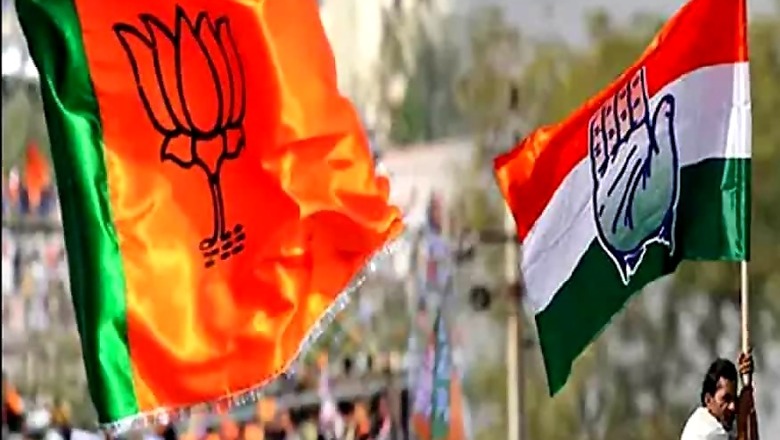
views
New Delhi: The Supreme Court will on Friday refused any interim stay on the electoral bond scheme and directed all political parties to furnish receipts of electoral bonds to the Election Commission. All parties must submit details of the identity of donors, amount in account of donors by May 30 in sealed cover, it said.
The top court was hearing pleas by the CPI(M) and the NGO Association of Democratic Reforms (ADR) challenging the scheme. It demanded that the names of donors be made public to ensure transparency in the poll process.
During Thursday’s hearing, the top court had contended that if the identity of the purchasers of electoral bonds meant for transparent political funding is not known, then the efforts of the government to curtail black money in elections would be "futile".
In this explainer, News18 looks at what are electoral bonds and why is it being debated?What is a bond?
A bond is a debt security, which is similar to an Instrument of Understanding (IOU). Borrowers issue bonds to raise money from investors, who are willing to lend them a sum for a certain amount of time. When you buy a bond, you are lending to the issuer, which may be a government, municipality, or a corporation.What is the 'electoral bond'?
The Finance Bill, 2017, introduced "electoral bonds", that are interest free bearer bonds. It is an instrument that is used to donate money to political parties. The parties involved will probably be a donor, the political party and the RBI -- which acts as the intermediary.Is it the first of its kind in the world?
It may be. None of the electoral finance experts that News18 spoke to could recall of a similar approach to party funding practiced in any other democracy around the world. Jagdeep Chhokar of the Association of Democratic Reforms, said that while there have been electoral trusts in India, the concept of electoral bonds is new.How was it introduced?
Electoral bonds were introduced by amendments made through the Finance Act 2017 to the Reserve Bank of India Act 1934, Representation of Peoples Act 1951, Income Tax Act 1961 and Companies Act. On January 2, 2018, the Centre notified the scheme for electoral bonds, which are designed to be a bearer instrument like a Promissory Note. These bonds can be purchased by an Indian citizen or a body incorporated in India.
Electoral bonds can be purchased from an authorized bank, issued to a political party and can be cashed in via the party’s verified account within 15 days. The identity of the donor will be known only to the bank and otherwise be kept anonymous.Are Electoral Bonds tax deductible?
Donations will be tax deductible, and the benefitting political party will get a tax exemption for the amount received. Further, the RPA Act has been amended in March last year, to exempt parties to inform the Election Commission (EC) of any amount received above Rs 2,000, if made through electoral bonds.How would transparency be maintained according to the Centre?
The Centre says that bonds can be purchased only from the State Bank of India. They can be bought by a donor with a KYC-compliant account.
The bonds will be available for purchase only for a period of 10 days in the beginning of each quarter, in the months of January, April, July and October. They can be bought for any value, in multiples of Rs 1,000, Rs 10,000, Rs 1 lakh, Rs 10 lakh or Rs 1 crore. The name of the donor will not be mentioned in the bond.
The face value of the bonds shall be counted as income by way of voluntary contributions received by an eligible political party, for the purpose of exemption from Income-tax under Section 13A of the Income Tax Act, 1961.
Centre has also harped on the point that political party will have to file returns before the EC as to how much money has come through electoral bonds, which will provide accountability.Why was the scheme challenged in court?
Several amendments in the Companies Act, Income-Tax Act, Representation of People Act, Reserve Bank of India Act and Foreign Contribution Regulations Act were made by the BJP-led government through the Finance Act, 2016, and 2017.
A three-judge bench led by former CJI Dipak Misra had issued notices to the Centre seeking its stand on the challenge to the law in October last year. It has been pending ever since. CPM had first moved the court in February 2018 against electoral bonds. The party had claimed that the non-disclosure clause would add to the woes of Indian democracy.
This is esentially on the grounds that ordinary citizens will not be able to know who is donating how much money to a political party. The mandate to disclose the name of the political party to which a donation has been made, has also been removed.
Association for Democratic Reforms (ADR), a non-governmental organisation, is one of the petitioners in the case. ADR had filed an application in the court seeking stay on the Electoral Bond Scheme, 2018, which was notified by the government in January last year.
It has said that amendments carried out in the relevant Acts have “opened the floodgates to unlimited corporate donations to political parties and anonymous financing by Indian as well as foreign companies, which can have serious repercussions on Indian democracy.”What did Election Commission have to say on the bonds?
The matter holds importance as the central government and the EC have taken contrary stands, with the former justifying the decision, saying it would promote transparency in political funding and the latter maintaining that the changes made in the law would have “serious repercussions”.
The EC told the Supreme Court that electoral bonds, contrary to government claims, wreck transparency in political funding.
Besides detailing how donations received through electoral bonds would cause a “serious impact” on transparency in funding of political parties, the EC also ripped apart amendments made to various key statutes through the two consecutive Finance Acts of 2016 and 2017.Why the identity of the donor is kept anonymous?
The Centre has stated that the right of the buyer to purchase bonds without having to disclose his preference of political party is in furtherance of his right to privacy. Keeping the identity of the donor anonymous is also an extension to his right to vote in secret ballot.
"This is necessary because once this disclosure is made, past experience has shown, donors would not find the scheme attractive and would go back to the less-desirable option of donating by cash", the affidavit quotes Finance Minister Arun Jaitley as saying.
CJI Ranjan Gogoi, however, contested his theory that the anonymous scheme ensured that all money which went into poll funding was white. “If the identity of the donor is unknown, your entire exercise to eliminate black money becomes a futile exercise. Black money only becomes white,” the CJI observed.What other allegations does the petition make?
The petition alleges that the bonds have been kept "secretive" for the benefit of big corporate houses. The amendments made to Companies Act 2013 exclude the requirement of disclosure of names of political parties to whom contributions have been made. The petitioner apprehends that this will lead to "private corporate interests taking precedence over the needs and rights of the people of the State in policy considerations"



















Comments
0 comment